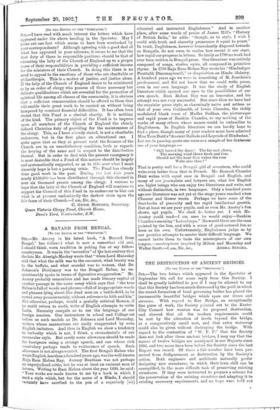A BAYARD FROM BENGAL. [TO THE EDITOR or THE "
SPECT■TOR."1 Anstey in his latest book, "A Bayard from Bengal," has followed what is now a somewhat old and, I should think, worn tradition in poking fun at my fellow- countrymen. It was in the "seventies" of tpe last century that the late Mr. Aberigh-Mackay wrote that " when Lord Macaulay said that what the milk was to the cocoanut, what beauty was to the buffalo, and what scandal was to woman, that Dr. Johnson's Dictionary was to the Bengali Baboo, he un- questionably spoke in terms of figurative exaggeration." Mr. Anstey probably remembers and has made literary capital of another passage in the same essay which says that " the true Baboo is full of words and phrases—full of inappropriate words and phrases lying about like dead men on a battle-field, to be carted away promiscuously, without reference to kith and kin." Not otherwise, perhaps, would a genially satirical Roman, if he could return to earth, write of English attempts to write Latin. Necessity compels us to use the language of our foreign masters. Our instructors in school and College set before us such models as Dr. Johnson and Lord Macaulay, writers whose mannerisms are easily exaggerated by even English imitators. And thus in English we show a tendency to verbosity which is not, I think, a characteristic of our vernacular style. But surely some allowance should be made for foreigners using a strange speech, and one whose rich vocabulary perhaps tends to exuberance of speech. Such allowance is not always wanted. The first Bengali Baboo who wrote English, less than a hundred years ago, was the well-known Raja Ram Mohan Ray. Jeremy Bentham was not perhaps an unprejudiced critic, but he was at least an eminent man of letters. Writing to Ram Mohan about the year 1830, he said: "Your works are made known to me by a book in which I read a style which, but for the name of a Hindu, I should "ertainly have ascribed to the pen of a superiorly [sic] educated and instructed Englishman." And in another
place, after some words of praise of James Mill's "History of British India," he adds : " though, as to style, I wish I could with truth and sincerity pronounce it equal to yours." In truth, Englishmen, however benevolently disposed towards us Bengalis, do not seem to realise how recent is our start, how rapid our progress in letters. So lately as 1790 no work had
ever been written in Bengali prose. Our literature was entirely composed of songs, stories, epics, all composed in primitive rhyme. In 1790 Raja Ram Mohan Ray wrote his "Hindudiger Pauttalik Dharmapramili," or disquisition on Hindu idolatry. A hundred years ago we were in something of M. Jourdain's predicament, and did not know that we could write prose,
even in our own language. It was the study of English literature which opened our eyes to the possibilities of our own speech. Ram Mohan Ray was an innovator, and his attempt was not very successful. But since then we have had the exquisite prose style, as charmingly naive and artless as that of your own Goldsmith, of Iswar Chandra, the richly modulated blank verse of Madhu Sudhan, the picturesque and rapid prose of Bankim Chandra, to say nothing of the works of many others whose names would be unfamiliar to Englishmen. In English literature we can hardly hope to find a place, though many of your readers must have admired Miss Toru Dutt's "Ancient Ballads and Legends of Hindustan." Let me, in passing, quote one verse as a sample of her dexterous use of your language :-
" Still barred thy doors! The far east glows,
The morning wind blows fresh and free. Should not the hour that wakes the rose Wake also thee ? "
That is pretty well for a Bengali girl of seventeen, who could write even better than that in French. Mr. Romesh Chunder Dutt writes with equal ease in Bengali and English, and many of our journalists and lawyers are, what few English are, biglot beings who can enjoy two literatures and write, not without distinction, in two languages. Only a hundred years ago our literature was not yet at the stage yours reached when Chaucer and Gower wrote. Perhaps we have some of the drawbacks of precocity and too rapid intellectual growth. But at least we are your pupils, and as even Mr. Anstey's fun shows, apt pupils. We shall do better yet. I wish Mr. Anstey could read—I am sure he would enjoy—Bankim Chandra's amusing "Lokrahasya." He would there see the man painted by the lion, and with a sense of good-natured fun as
keen as his own. Unfortunately, Englishmen judge us by our prentice attempts to master their difficult language. We cannot invite them to taste the masterpieces of our own tongue,—masterpieces inspired by Milton and Macaulay and
Walter Scott.-4 am, Sir, &c., ANDRA SINGES.






































 Previous page
Previous page